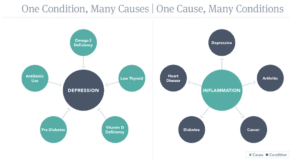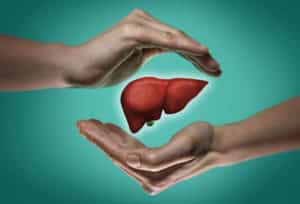Before I went to nutrition school if someone had said the word Ashwagandha, I would have had no clue what they were talking about. Now it’s a common herb in the repertoire of the many options available we can use to help with cortisol regulation and adrenal support.
Taking Ashwagandha has been shown to help reduce anxiety, morning cortisol, c-reactive protein, pulse rate, and blood pressure in chronically stressed adults (1). It’s thought to have these varying effects by way of the HPA Axis (Hypothalamic-Pituitary-Adrenal Axis). This is what regulates the communication between your adrenals and your brain.
The HPA Axis can become dysregulated by a slew of different root causes (which we discussed in Part 1 so go back and check those out!). This will probably come as no surprise, but one of the biggest root causes is physical and also mental and emotional stress. 2020 was a highly stressful year for many. If you’ve dealt with too many days in a row of anxiety, high cortisol, increased inflammation, and high blood pressure, this article is for you. Too much stress is a recipe for burnout.
And this is what I’m hearing lately…. clients, friends, family are reporting fatigue, anxiety, lack of motivation and optimism, and physical symptoms like stomachaches. If you’re dealing with this, read on dear ones…. In Part 2 of How to Recover from Burnout, we’re digging into the dietary, supplemental, and lifestyle strategies that can pull you out of that hole and get you back on your feet.
Dietary Strategies to Help with Burnout
The Caffeine Conundrum
Are you relying on stimulants to get through the day? This is one sign of burnout, and although it’s THE HARDEST thing I ask clients to do, reducing or eliminating caffeine is typically vital to improving hormone balance and recovering from burnout.
I wrote an article on Kicking Caffeine for Coffee Lovers to help you with this one. If fully ditching coffee makes you want to dive headlong into the nearest coffee shop screaming for dear life, try Organo King Coffee. It has reishi mushroom in it (and still tastes amazing) which helps to balance the HPA Axis. You’ll get your coffee in a measured amount so you’re not taking down to big a load of caffeine and the reishi will help modulate your response to the caffeine. You might find this to be helpful in and of itself, or at least it will be a bridge to eventually ditching caffeine.
If You’re Intermittent Fasting & Low Carbing It
Intermittent Fasting (IF) and low carb diets are all the rage, and for good reason. Both of these strategies can be wonderful interventions for insulin resistance and to help with weight loss, detoxification, and reduce inflammation. They help with binge eating and sugar addiction. As many of these issues are common, I recommend these approaches on the reg.
However, if your hormones are in the dirt, it’s typically not the best approach. (Caveat that if your hormones are in the dirt due to the above listed concerns and those are the root causes for your symptoms of burnout, then maybe.) But, as a general rule, when you’re in a state of adrenal fatigue, it’s recommended that you don’t skip meals, and that you get some healthy carbohydrates in your meals. This doesn’t mean go nuts on carbs… It just means that including a portion of some sweet potatoes, brown rice, or fruit at meals is a good idea.
I’ve met with many women (and been one myself!) who is eating very low carb and finds it beneficial for some things, but over time begins to fizzle out on energy. Here’s a tip! If it’s hard to think of throwing carbs entirely back in, eat a portion with your dinner, and then make sure not to skip breakfast. That’s one strategy that may be enough to help with cortisol balance, without throwing off the other benefits you initially found from IF and low carb.
Also, make sure you’re not calorie restricting! You might want to track for awhile if you’ve been only eating a couple meals a day or avoiding certain foods to make sure you’re getting enough caloric intake on a daily basis.
Sugar and Processed Carbs
Life is a balance isn’t it? So, on the flip side make sure you’re not overeating sugar and processed carbohydrates. It’s ideal if you’re ultimately avoiding these, but if you do okay with an occasional indulgence, that’s fine. If you eat one, and it leads you to ten more, or days on end of sugar, than avoid these altogether. But, if you can do the occasional sweet and avoid the rest of the time, then good on ya! Just start with the 80/20 rule or 90/10. Avoid it the bulk of the time, and once in a while; enjoy!
Whole Foods!
I know you’ve all heard this one, but in today’s world of processed and packaged foods, there can never be enough reminders. Make sure to eat nutrient dense foods. These are foods that have a lot of bang for the buck! You get a lot of vitamins, minerals, and phytonutrients wrapped up with your calories. This includes the rainbow of veggies, 2-3 servings of fruit per day, naturally raised animal protein like eggs, fish, poultry, beef, etc., healthy fats like nuts, seeds, and avocados, and whole grains.
Ditch the canned, boxed, and frozen processed foods as much as possible. And of course avoid fast food, and other take-out items that don’t give you the above mentioned nutrient dense foods. You’ll truly feel the difference!
Eat Foods for your Microbiome
I talk a lot about digestive health as it’s soooo vital for overall health in the body and mind. A great first step is to include fermented and cultured foods daily. This is because they contain probiotics which are beneficial bacteria that help increase diversity in the microbiome and support gut health. If you’ve noticed these foods don’t work well for you, read THIS ARTICLE on some of the root issues that can cause digestive issues.
Assuming you tolerate them well, some options that you can incorporate include yogurt and kefir with “live and active cultures”. Kimchi, sauerkraut, and other cultured veggies are great options. Make sure that these items are found in the refrigerated section of your grocery store and have sea salt and NOT vinegar in the ingredients. This is the best way to know if they’re truly cultured and will give you that good bacteria.
Eat to Balance Blood Sugar
Make sure to eat balanced meals to help balance blood sugar. This means you’ll want to include 15-25 grams of protein in meals and also some healthy fat and fiber. You can get fiber by making sure your plate is half full of veggies and you’re eating starchy plant based carbs some of the time. This includes sweet potatoes, winter squashes like butternut or acorn, and/or cassava or taro.
Eating well balanced meals like this regularly can help keep blood sugar in check!
Supplements to Help with Burnout
Supplements can make a big difference in helping with burnout. The first thing I think about in identifying appropriate supplements for a client dealing with symptoms of burnout is what the root causes are. Make sure to go back and read Part I to see all the possible root causes. These are things you can test for, and this will help tailor what will best support you.
This will give you a great start to choosing some options to support you and help you begin regaining your vim and vigor 😉
Adaptogenic Herbs and Mushrooms
These are herbs that are known for enhancing adrenal and immune function, and can help with physical and mental endurance. They are called adaptogens because they help the body adapt to its environment. They help via the HPA Axis which is how your brain and adrenals talk! They can help balance levels of cortisol throughout the day. You’ll want to give them a try for 2-3 months before deciding if they’re working or not. There are MANY different adaptogenic herbs and they all have their own unique benefits….
Maca
Also known as Peruvian Ginseng, Maca can support adrenal and healthy estrogen and testosterone levels. It is often known for supporting fertility, libido, stamina, and energy. Try getting this one in a powder and adding it to smoothies!
Licorice
One of my personal FAV herbs for adrenal support is licorice. Early on in my health journey as I was working on healing my gut and supporting adrenal health, this one did wonders! If you tend to have low blood pressure this one can help. (However it’s contraindicated if you run high!) Licorice helps keep cortisol around longer, which can help increase energy and decrease inflammation. It can also help with intestinal permeability (leaky gut), and relieve adverse digestive issues too. If you like the taste of licorice, try brewing a nice strong licorice tea!
Ashwagandha
Ashwagandha! Back to this lovely herb…. If you’re needing some calming support to help you unravel your nerves and help support sleep, this may be the one for you. If you’re feeling “wired and tired”, this is a good option. It’s also helpful for those needing thyroid support.
Cordyceps
Another FAV of mine is Cordyceps. I’ve always been a fan of therapeutic mushrooms, and Cordyceps is one that I really noticed a difference with. This mushroom is known to nourish the adrenal glands and also support liver function. Anytime we help the liver, we’re also helping with hormone balance overall! This is my FAV TEA that has Reishi, Cordyceps, and gives you a boost without the caffeine.
Reishi
On the topic of mushrooms, Reishi is another great option. It supports healthy levels of inflammation in the body, and can help with blood sugar and hormone balance. Both of these are vital for feeling vital and energized without feeling wired.
Eleuthero
Eleutherococcus was one of the first herbs I was prescribed when I started looking into naturopathic care for my health. It can help reduce or eliminate fatigue and is best taken earlier in the day. It’s immuno-supportive and has been shown to improve memory.
Rhodiola
Rhodiola can help promote a calm emotional state and strong mental performance. It supports the immune system and is balancing to hormones. If anxiety is present, this may be one to consider. Rhodiola can help improve mental and physical stamina, sleep, and reduce irritability. It truly can help with the feeling of burnout!
Holy Basil
Holy Basil has been used in India for over 5,000 years, and can promote longevity while also calming the mind and spirit. It helps to balance inflammation and elevate mood. It may help protect the liver. It has a long history of use, and not to be confused with basil from the herb cabinet. This one is different!
Vitamins and Minerals (and an amino acid!)
Vitamin C
I always think about this vitamin around the holidays. We use vitamin C in sugar metabolism, to make cortisol, and also in immune function. SO, at the holidays if sugar consumption is high and stress is high, it would explain why people get sick after the holidays. One reason could be that they’ve burned through more vitamin C and their immune function is down!
Vitamin C is required for making catecholamines, otherwise known as stress hormones. The adrenals are one of the organs with the highest concentrations of vitamin C. They depend on this to do their job! Whens stress levels are higher, it’s important to take more vitamin C. Some foods high in vitamin C include broccoli, citrus fruits, strawberries, and red bell peppers. If you want a food source in supplement form, try camu-camu or amla.
B Vitamins
Stress, sugar, and alcohol all deplete B vitamins. B’s are essential for life and for making and regulating our genes, producing energy, regulating blood sugar, enhancing our moods and cognitive abilities, and maintaining cardiovascular fitness. They’ve often been referred to as anti-stress vitamins, because they help provide more resilience to the mental and physical consequences of chronic stress. Aim for an activated B Complex, making sure you’re getting good bioavailable forms of these vitamins.
Omega 3’s
These lovely fatty acids come up as important for so many different things! They appear to play a critical role in HPA Axis function. An association has been found between omega-3 fatty acid deficiency and elevated levels of corticotropin-releasing hormone (CRH), a peptide hormone that stimulates production of adrenocorticotropic hormone in the pituitary gland, and, subsequently, cortisol production by the adrenal glands. Omega-3 fatty acid deficiency is also linked to elevated salivary evening cortisol.
In short, this means that if one is low in omega-3 fatty acids, it can cause a ruthless cycle of chronic inflammation and increased stress response; a recipe for burnout! On the flip side, getting enough omega-3’s can help support a more resilient stress response and balance inflammation.
Magnesium
Magnesium is essential in the body for over 300 different enzyme reactions. It helps muscle cells relax, and….. Here we go again! It helps support the HPA Axis. Thus, it supports adrenal function. Not only that but magnesium is vital for bone support, brain function, and a slew of other important processes in the body. Foods high in magnesium include:
- Dark leafy greens
- Almonds
- Cashews
- Pumpkin seeds
- Avocados
- Brussels sprouts
For supplemental magnesium, I recommend magnesium glycinate as glycine is also calming!
L-Theanine
L-theanine is an amino acid found in green tea that supports a balanced stress response. It can promote a calm, but focused state. In order to get enough from green tea, you may need to drink three or more cups per day. If that’s not going to work, it can be taken in supplement form. Make sure to choose organic to reduce exposure to pesticides and other toxins.
Lifestyle Strategies
No matter how many nutrition strategies you include and how many supplements you take, you simply cannot overcome burnout if you’re not sleeping, stressed all the time, and running yourself raw.
Don’t Over Exercise
Ok, all you Crossfitters…. If you’re pushing it hard for too long and feeling exhausted the next day, it’s a sign that it may be too much. If you go on vacation and skip your workouts for a week and you realize your energy is better, and then you come home and hit the gym and it feels great! But, the next day you’re back to burnout, it’s time to adjust the workouts. Try reducing the length of time and the intensity. You can still do the type of workout you enjoy, but just pull it back in time and intensity and see if that makes a difference the next day.
As someone who LOVES dance, yoga, HIIT, kickboxing, swimming, and a whole variety of physical activities, it is the hardest, I know. But, if you’re in a state of burnout, hitting it too hard at the gym is just going to hold up your recovery. Lean into yoga, tai chi, and pull back on the heavy workouts for a while. Many people are able to return to some of that once they recover.
Get at least 8 hours of sleep per night and preferably EXTRA
Can you grab an extra hour of sleep per night? Good quality sleep is vital for burnout recovery. If you can get extra, that is ideal. And this should be deliciously deep and rejuvenating sleep. If you’re tossing and turning every night, try some sleep hygiene strategies. Check out this article to Bring on Better Sleep.
Implement a Daily Mindfulness Practice
Meditation is a great option that can be done two times per day that fit into your schedule. If you’re just getting started, just go for 3-5 minutes. You can use an app like Insight Timer or Calm. Or you can just set a timer for 5 minutes and focus on deep breaths. Let it be easy! If thoughts come, acknowledge them and then allow your mind to softly drift back onto your breath. Ideally sit up with some support so you’re comfortable. But, if you’re whipped, go ahead and lay down.
Get out in Nature
Nature is typically relaxing for most people. If you can at least gaze out a window or better yet go sit outside on occasion this can be very calming and grounding. If it’s cold out, just do some window gazing periodically. Or take a brisk walk through a nearby park even if it’s short. Nature is always nearby ready to help you reconnect 😉
Honor Your True Emotions
Often anxiety, depression, fatigue, and other symptoms of burnout can be a result of not honoring the truth about how you’re feeling. It can help to speak with a therapist or coach and dig into what’s really going on in your mind and body and how it feels. I’m an optimist, but sometimes in the process I lock up how angry or frustrated I am about something and it ends up just making me tired. Incompleted stress responses in the body can really add up to a big dose of burnout! I’ll be coming out with more articles on this in the future, but for now a great way to learn about it is to read the book, Burnout by Amelia Nagoski and Emily Nagoski. They brilliantly described what I learned about dealing with my stress from Somatic Experiencing and now use with clients. It’s amazing how revitalized one can feel when they cough up the truth to someone safe and have a good cry. I always feel more energy after a good therapy session!
So there it is ladies. If it seems like a lot to get started on, just pick one adaptogen, and one dietary and lifestyle strategy to get started on. Baby steps. It’s amazing sometimes what just one shift can do!










